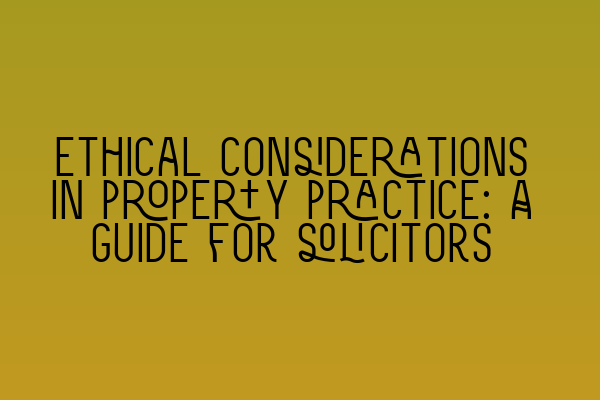Ethical considerations in property practice: A guide for solicitors
As solicitors specializing in property law, it is crucial to understand and navigate the ethical considerations that arise in our practice. Ethical principles guide our professional conduct, ensuring transparency, fairness, and integrity in our interactions with clients, colleagues, and the broader community. In this comprehensive guide, we will explore key ethical considerations that solicitors must be aware of in property practice.
The duty of confidentiality
One of the fundamental ethical obligations for solicitors is the duty of confidentiality. Confidentiality is essential in maintaining the trust and confidence of our clients. It means that we must not disclose any information shared by our clients, unless authorized by law or with the client’s consent. This duty extends even after the solicitor-client relationship ends.
However, there may be circumstances where the duty of confidentiality conflicts with other ethical considerations. For example, in cases involving money laundering, solicitors have a legal obligation to report suspicious activities. Balancing these competing obligations requires careful judgement, ensuring compliance with the law while respecting client confidentiality.
For a comprehensive understanding of legal challenges in property transactions, I highly recommend reading our related article: Legal challenges in property transactions: A comprehensive guide.
Avoiding conflicts of interest
Conflicts of interest can undermine the solicitor-client relationship and compromise the integrity of property transactions. Solicitors must identify and manage any conflicts of interest that may arise during their practice. A conflict of interest arises when a solicitor’s personal, professional, or financial interests conflict with the interests of their client.
To ensure proper management of conflicts of interest, solicitors should have robust conflict-checking procedures in place. This includes conducting thorough due diligence when accepting new clients or engaging in property transactions. Regularly reviewing and updating conflict registers can help identify potential conflicts and enable prompt action to mitigate any risks.
If you want to learn more about how to dominate property law questions and avoid common pitfalls, check out our related article: Dominate Property Law Questions: Avoiding Common Pitfalls.
Transparent fee structure and billing practices
Transparency in fee structures and billing practices is a key ethical consideration for solicitors. Clients have the right to be informed about the fees and expenses they will incur during a property transaction. Providing clear and comprehensive fee estimates, explaining the billing process, and promptly addressing any client queries regarding fees are essential in maintaining trust and avoiding disputes.
Solicitors should ensure their fee structure is fair and reasonable, taking into account the complexity of the matter, the time spent, and the expertise required. Any additional charges, such as search fees or disbursements, should be clearly communicated to clients upfront. Regular communication regarding costs and billing updates throughout the transaction can enhance transparency and avoid surprises.
Environmental considerations in property transactions
Environmental ethics play a significant role in property practice and should be part of a solicitor’s ethical considerations. Sustainable development and environmental impact are increasingly important factors in property transactions. Solicitors should be aware of relevant environmental legislation, planning regulations, and potential risks associated with a property’s environmental history.
When dealing with contaminated land, solicitors must ensure proper due diligence, such as conducting environmental searches and disclosing any known contamination to clients. This information enables clients to make informed decisions and helps prevent potential harm to the environment and public health.
For further insights into environmental ethics in land law and the importance of balancing development and sustainability, I recommend reading our related article: Environmental Ethics in Land Law: Balancing Development and Sustainability.
Case studies in property law
SQE case studies in property law offer invaluable practical insights into real-world scenarios that solicitors may encounter. These case studies provide opportunities for solicitors to apply ethical considerations and legal knowledge to complex situations. By analyzing and discussing case studies, solicitors can improve their ethical decision-making skills and enhance their professional practice.
If you are interested in exploring SQE case studies in property law, our related article provides a collection of real-world scenarios: SQE case studies in property law: Real-world scenarios.
Understanding and navigating ethical considerations in property practice is vital for solicitors to uphold professional standards and maintain the trust of clients and the community. By integrating these ethical principles into our daily practice, we can provide high-quality, transparent, and ethical legal services to our clients.
For a comprehensive guide to land law revision tips and exam preparation techniques, don’t miss our related article: Land Law Revision Tips: Ace Your Exam Preparation.
Remember, ethical practice is not just a legal requirement; it is the foundation of our professional identity as property law solicitors.
